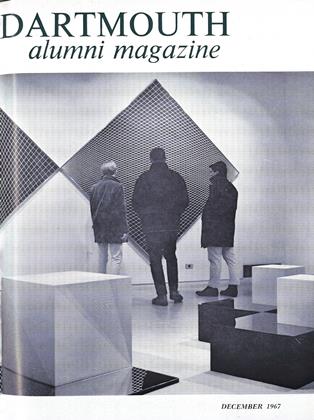"It's exciting to be where the stuff of history happens; challenging to try and figure out what it means." This is how WILLIAM C. BEUTEL '53 describes his job with New York's WABC-TV.
In addition to doing the 11 p.m. weekday news, Bill has narrated two Emmy Award-winning specials - "Dong Xoai: The Town the Viet Cong Couldn't Kill" and "Who Will Tie My Shoe?", a program on retarded children which also won the Albert Lasker Medical Journalism Award. He has an Emmy contender this year in "Sleep: The Fantastic Third of Your Life."
As a boy in Cleveland, he was fascinated with the on-the-scenes reporting of Edward R. Murrow. Since break- ing into radio there in 1957, and later TV, Bill has made the scene from Vietnam to Staten Island.
His July 1965 visit to a Special Forces camp in South Vietnam he cites as "professionally the most satisfying thing I've ever done." It was unusual for a reporter to be in the midst of things that early in the war. He hopes to return when he can do a follow-up report.
Also challenging to him as a network reporter were the 1964 national political conventions, where his several scoops included an exclusive interview with Governor Rockefeller immediately following the nomination of Barry Goldwater.
He reported the pomp and pandemonium surrounding the New York visits of Premier Khrushchev, John Glenn, and Pope Paul. (Even in a tense situation, Bill characteristically notes the humor. He recalls that the high school band near him at Kennedy airport greeted Pope Paul's emergence from his plane with a rousing "Hello Dolly.")
Bill covered the events following the assassination of President Kennedy for ABC Radio and TV, including the first reactions of people in the streets of New York.
Though his reporting gets him around, he doesn't do as much leg work as he'd like. His normal workday runs from noon till midnight and his numerous duties include moderating Channel 7's Sunday public affairs program, "Page One" and "New York, New York." There's a sports documentary upcoming on Gambling College, a small Negro institution, and its contribution to professional football. He has also done many shorter specials (20 to 25 minutes) on local problems: garbage, schools, taxes, air pollution.
Bill, who looks good from any angle, enjoys a kind of Perry-Como-nice-guy image both with viewers and fellow broadcasters. They elected him to the board of governors of the New York Chapter of the National Academy of Television Arts and Sciences and Vice President of the Radio Television Newsreel Working Press Association.
One of his co-workers describes him as "one of the nicest guys in the business, and one of the most professional."
And a New Yorker classmate adds, "Of course the news itself is still lousy, just as it always is, but it's a whole lot easier to stomach when you've got a friendly classmate telling you about it."
 View Full Issue
View Full Issue
More From This Issue
-
 Feature
FeatureFood for Alumni Thought
December 1967 -
 Feature
FeatureThe Dartmouth-Talladega Alliance
December 1967 By WILLIAM R. MEYER -
 Article
ArticleWith the Big Green Teams
December 1967 -
 Article
ArticleThe Undergraduate Chair
December 1967 By JOHN BURNS '68 -
 Class Notes
Class Notes1923
December 1967 By WALTER C. DODGE, DR. THEODORE R. MINER, TRUMAN T. METZEL -
 Class Notes
Class Notes1941
December 1967 By EARL H. COTTON, LOUIS A. YOUNG JR.







